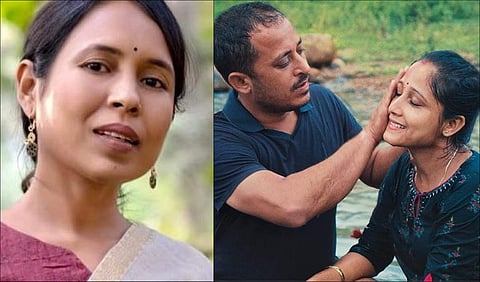

Rima Das’ movies tell stories of struggle and hope, anxieties and aspirations, with a disarming realism. They feature narratives that are deeply rooted in the social setting of her home state, Assam. The self-taught filmmaker, who shot to fame with her second feature, the National Award-winning Village Rockstars (2017), has made a space for herself in the national and international cinema circuit.
Her latest feature, Tora’s Husband, premiered at the Toronto International Film Festival (TIFF) last year and went on to garner critical acclaim. Set in the time of the pandemic, it tells the story of a loving husband and a kind neighbour, who struggles to keep his small-town business afloat while his relationships deteriorate, amidst loss and lockdowns. The movie is set for theatrical release in major cities across India and Australia on September 28.
Excerpts from the interview:
Tora’s Husband was the first Indian film to be selected in the Platform section at TIFF, a section for most original and distinct voices.
It was an honour. It’s always a great feeling when you are recognised for your vision as a filmmaker.
The film has been a hit in the festival circuits. What are your hopes and expectations for the theatrical release?
I am very hopeful. I am always hopeful (laughs). The audiences of film festivals and theatres are different, but the movie tells a story that many people can identify with. It is also quite different from my previous films. We’ll have to wait and see how it goes.
How was the experience of shooting during the lockdown?
It was very challenging. Everybody was going through a lot, including myself. And it was not just the Covid-19 situation. I lost my father during the initial days of shooting but I decided to finish the film. That took a toll on me, mentally and physically. The movie is dedicated to him. Now when I look back, I realise the movie has transformed me in many ways.
How so?
I was reading the Gita recently, and it says grief is also yoga. That struck me. I started relating more with Jaan, the protagonist of Tora’s Husband. He is faced with tragedy after tragedy—that makes him sad and angry, but there is also acceptance. I realised that life is never completely in anyone’s control. Sometimes you just have to calm down and focus on your duties and the work at hand.
The movie is one of the few realistic depictions of the pandemic to come out in India, shot in real-time. Did you also want to document the times?
It is about the pandemic, but only to an extent. Tora’s Husband is fundamentally about the personal journey of a common man. It is about how relationships are affected in difficult times. It is also the story of the wife, the kids and a lot of other people and how they deal with their lives and circumstances. The pandemic was the setting, but the emotions are universal I think.
The movie casts a real-life couple, your brother Abhijit and his wife Tarali Kalita Das, in the lead roles. What was it like directing family?
It was an entirely new and often overwhelming experience because they know me so well (laughs). Both of them are non-actors but Tarali was always eager about acting. There were issues of professionalism, like sticking to a schedule every day that Abhijit found hard at first. But they both worked it out. Also, both of us, my brother and I, were grieving the loss of our father, but very differently.
Would you consider Tora’s Husband a more personal work in that sense?
All my work is personal. They are all close to my heart and are stories I wanted to tell. With Tora’s Husband, the setting and characters were more familiar to me. Unlike a movie like Village Rockstars which was shot in the countryside, for which I had to observe and understand how life was in the village. This film is closer home, in that sense.
You wrote, directed, shot, edited and produced the movie and your previous ones as well. Do you like working that way?
I must say I do. But it has its positives and negatives. A good thing about working alone or with a small crew is that there is that much more freedom with regard to artistic choices. But in some aspects, it can be limiting as well. For instance, I never had any camera education. So when I shoot, I sometimes feel limited. I wish to work with good cinematographers and production designers.
Do you think the national and international recognition for your movies have changed you as a filmmaker in any sense?
That is always a difficult question for me. I don’t think it has changed me as a filmmaker. It has given me a greater sense of responsibility and confidence. It has also increased my access to cinema spaces and resources. But when I start working on a movie, it’s always the same and I’m always learning.
I recently worked on a film in Melbourne, with an entirely Australian cast. It was a completely new experience altogether. I feel it’s too early for me to think in terms of ‘success’.